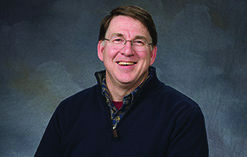Colgate Professor Elected New Mayor of Hamilton

Professor of Art and Art History Bob McVaugh will be fixing rifts between Colgate and the Village of Hamilton.
Colgate Professor of Art and Art History Bob McVaugh was elected as the Mayor of Hamilton this past June. Other candidates running for the position included incumbent Margaret Miller and Democrat Harvey Kliman. Three is a rather unusual number of candidates for Hamilton’s mayoral elections, which have had one or two candidates in the past.
This is McVaugh’s first elected office, but he’s not a rookie in the Village of Hamilton’s government. McVaugh and his wife, Sue McVaugh, have lived in Hamilton for 35 years and both quickly became involved in the community soon after arriving. Bob McVaugh joined the board of the Hamilton Public Library, volunteered as a coach and referee for youth hockey and directed the Hamilton planning board, which manages the village’s land use and matters of zoning laws, for 15 years. Sue McVaugh was elected to the Village Board of Trustees and served for over a decade. Then, she successfully ran for mayor and served three terms from 2005-2011.
“Go ahead, make a Clinton joke,” Bob McVaugh said. “We’ve heard them all.”
So why follow suit? McVaugh said that he is following in his wife’s footsteps for the gratification of contributing positively to the Village of Hamilton.
“One of the great rewards of participating in local organizations … is that you can actually see the manifestation of your efforts. You can see the good that you’ve done for others. [Sue and I] thrive on that,” McVaugh said.
The size of Hamilton is what drew McVaugh to the job. The larger the constituency, the more skeptical he becomes about the value of regulations and their ability to benefit an entire region.
“I’m not interested in politics at [the state] level; I’m interested in helping my neighbors,” McVaugh said.
As mayor, McVaugh leads public monthly meetings with the Village Board of Trustees, the official legislative body of Hamilton. Controversial or complicated issues often warrant special meetings, which are also open to the public.
“I have a confidence in the village residents that if they understand issues, they will be able to provide advice to those who are responsible for the administration of the village,” McVaugh said. “I believe in trying to keep the community involved.”
The upcoming deer culling is the primary topic on the agenda for the next meetings, McVaugh said. Culling is the process of controlled hunting and will be used as a means of trying to maintain the deer population in the area. After several years of research and planning, this is the first year the Village of Hamilton will execute the deer culling. In fact, this was one of the promises McVaugh made in his campaign – that he would proceed with the project in a thoughtful manner. McVaugh believes one of his strengths is dealing with controversial and complicated issues like this.
“I tend to emphasize the complexity of questions and try to always remain aware of what some people may call unintended consequences. I think the community is not served well if we isolate questions and … simplify the decision-making process because it may be easy but it isn’t wise. It leads to reactive governing rather than proactive,” McVaugh said.
One of McVaugh’s essential strengths as a mayor is his attentiveness to the interests of many different people and groups, as he must balance the interests of the Village of Hamilton with the interests of Colgate University.
“[As a professor,] he was engaging, reached out to specific students’ interests and was accessible whenever anyone needed help. He wanted his students to succeed,” Colgate alumna Deirdre Plaus ’15 said.
Murray W. and Mildred K. Finard Associated Professor in Religion and Jewish Studies Lesleigh Cushing, who worked with McVaugh on Colgate’s Campus Master Planning Committee, is confident in McVaugh’s ability to carefully consider decisions and remain level-headed when faced with conflicting interests.
“Bob always focused on the concerns of the village, frequently insisting that the committee reconsider any planning that might negatively affect Hamilton. With his extensive knowledge of the village’s history, zoning and economics, he consistently made a strong case for the village’s concerns in thinking about the future of Colgate,” Cushing said.
McVaugh is highly aware of the role that he plays in balancing his two identities – Mayor of Hamilton and Colgate Professor.
“It’s not uncommon for me to say in discussions I’m putting on one hat or the other. I’m very aware that Colgate’s understood interests are not necessarily the interests of the community on the whole, but they are a huge factor,” McVaugh said.
McVaugh noted how changing the way we think about the relationship between Colgate and Hamilton will be a positive step.
“The community and Colgate have developed a rhetoric over the past 10 years in which we talk about Colgate and the village as if they are two separate entities. To the degree that we can stop talking about it as Hamilton and Colgate, we’re better,” McVaugh said.






